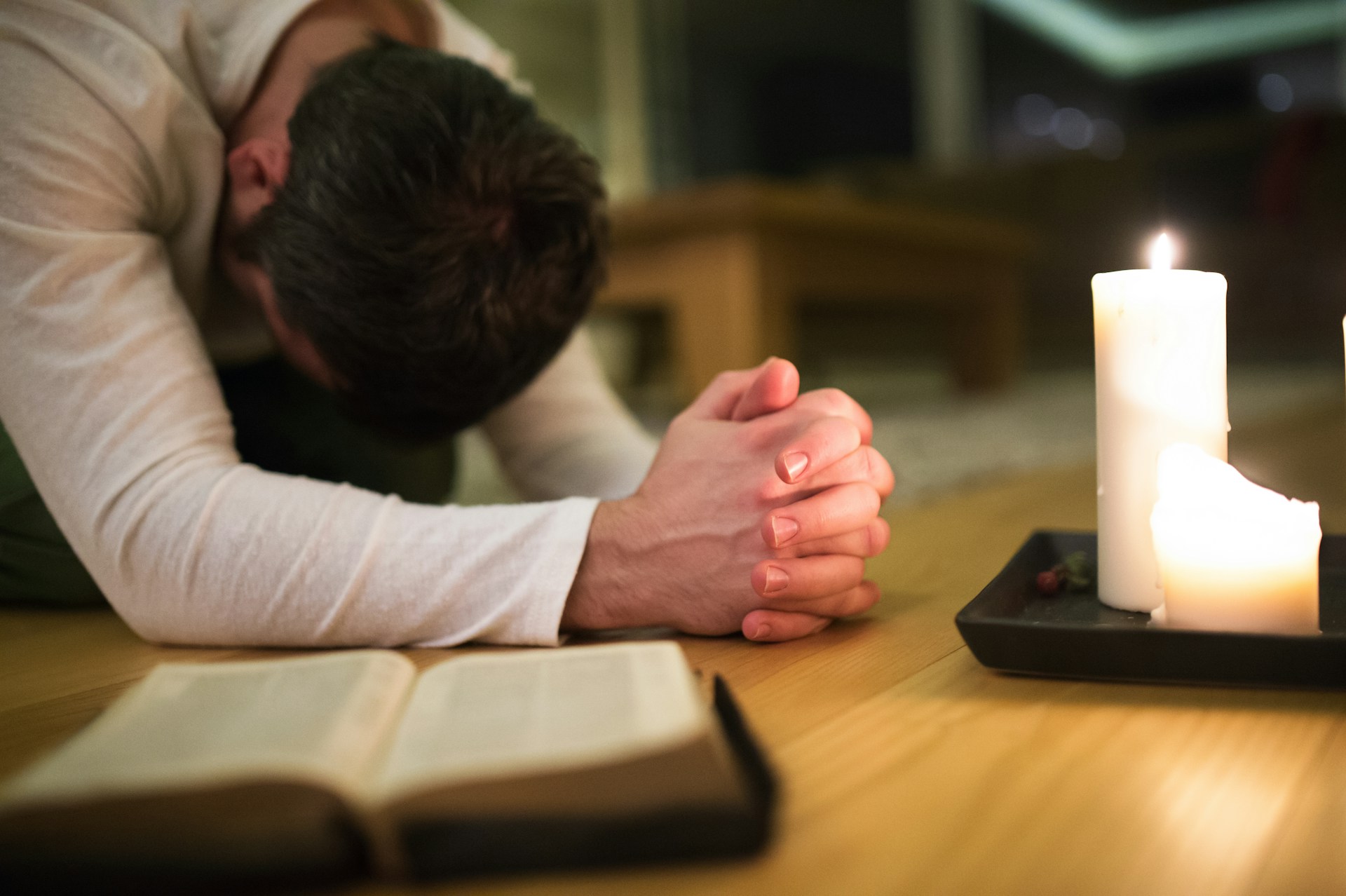One of the things we have in common is that we all need to step back from whatever is happening in our lives, close our eyes, and become lost in sleep. We all need to sleep, and being able to sleep despite turmoil in our lives is a gift the Lord gives us. That’s why David can say,
I lie down and sleep; I wake again, because the Lord sustains me. I will not fear though tens of thousands assail me on every side – Psalm 3:5-6, NIV
When we sleep, it allows us to recharge ourselves and maintain our well-being physically, spiritually, and mentally. Amid all this, however, is the reality of sleep anxiety. Sleep anxiety, which is sometimes called sleep-related anxiety, is a condition that disrupts a person’s ability to fall asleep, stay asleep, or get restful and quality sleep. Many people struggle with this condition, which is rooted in persistent worries, fear, and nervousness around sleep.
Causes of Sleep Anxiety
Sleep is a necessary part of our lives. When you don’t get enough sleep, it affects how you react to others and your capacity to engage in creative thinking. It even impacts how you feel about yourself and the world around you. As necessary as sleep is, it can be disrupted in several ways, and different factors can contribute to sleep anxiety.
 One of the factors that can lead to sleep anxiety is when you’re experiencing stress and feel overwhelmed by aspects of your life. If you’re undergoing significant life changes, or you’re facing a lot of work pressures, or if there’s relational or other conflict you’re dealing with in your life, that can all heighten your levels of anxiety, affecting your sleep negatively. If you have an anxiety disorder like social anxiety, that too puts your sleep at risk.
One of the factors that can lead to sleep anxiety is when you’re experiencing stress and feel overwhelmed by aspects of your life. If you’re undergoing significant life changes, or you’re facing a lot of work pressures, or if there’s relational or other conflict you’re dealing with in your life, that can all heighten your levels of anxiety, affecting your sleep negatively. If you have an anxiety disorder like social anxiety, that too puts your sleep at risk.
In addition, if a person has a sleep disorder, that may contribute to or serve to worsen sleep anxiety. Disorders such as restless leg syndrome or sleep apnea can cause issues with one’s sleep and worsen the anxiety surrounding it. If a person has a traumatic experience, or they have post-traumatic stress disorder in the wake of a traumatic experience, these may also contribute significantly to having sleep anxiety.
Lastly, several lifestyle factors can play a role in sleep anxiety. If you have an irregular sleep schedule, have a lot of screen time before bed, or consume nicotine and caffeine, you’re at a higher risk of sleep anxiety. Your body and mind are affected by what you expose them to, and the quality of your sleep can deteriorate drastically if you don’t keep a close eye on things.
Signs of Sleep Anxiety to Look Out for
 Sleep ought to be a pleasant experience, a safe space of daily repose that gives us rest from our daily labor and helps us to reset for another day. If you see signs of sleep anxiety in your life, it’s important to address these before they get worse.
Sleep ought to be a pleasant experience, a safe space of daily repose that gives us rest from our daily labor and helps us to reset for another day. If you see signs of sleep anxiety in your life, it’s important to address these before they get worse.
Some of the signs of sleep anxiety include rumination and racing thoughts. When this happens, a person’s mind feels as if it’s being flooded with concerns and worries that are difficult to dismiss or quieten. When a person has such thoughts, they will often feel agitated and restless, and that makes it harder to relax or fall asleep.
Another sign of sleep anxiety is having a fear of not being able to fall asleep. If you’ve been struggling with falling asleep for whatever reason, over time, you may start to worry about the fact that you haven’t been able to sleep as much as you’d want. That fear and worry can create a self-fulfilling cycle of worry that you get trapped in.
Sleep anxiety is also accompanied by physical symptoms, including muscle tension, tension headaches, and a rapid heartbeat. Experiencing these symptoms during the day or close to bedtime can make it even harder to fall asleep or stay asleep.
The Impact of Sleep Anxiety on Daily Life and Relationships
We need our sleep. In a Doctor Who episode titled “Sleep No More,” the 12th Doctor says, “Sleep is essential to every sentient being in the universe. But to humans…it’s an inconvenience to be bartered away. Well, now we know the truth. Sleep isn’t just a function. It’s blessed. Every night we dive deep into that inky pool, deep into the arms of Morpheus. Every morning, we wake up and wipe the sleep from our eyes.”
Sleep is indeed blessed, and it’s one of the many blessings the Lord has bestowed upon us. As you can imagine, not getting adequate sleep can have many negative consequences on a person’s well-being.
Some of the ways a lack of sleep from sleep anxiety can affect a person include the following:
 Fatigue Not getting restful sleep results in fatigue during the day. When you’re tired, it can affect your ability to concentrate, remember, make decisions, and be productive, in general.
Fatigue Not getting restful sleep results in fatigue during the day. When you’re tired, it can affect your ability to concentrate, remember, make decisions, and be productive, in general.
If you’re tired and not alert, that can seriously compromise your performance, whether that’s at home, work, or school. One ripple effect of that is that it can go on to cause even more anxiety and stress, feeding the cycle.
Emotional Reactivity When you haven’t slept well, it can affect your ability to handle your emotions well. Sleep anxiety can lead to fatigue, and being in that state can increase your mood swings and irritability. If you’re tired, it makes you more vulnerable to impatience and frustration with others, and you’re more emotionally reactive.
Relationship Strain One of the effects of being emotionally reactive or impatient and irritable with others, is that it strains your relationships. When you have mood swings, they can contribute to conflict and misunderstandings with loved ones or the people you work with.
In a family setting, a lack of sleep can mean diminished energy to enjoy one another or to maintain the household. The altered emotional dynamics in the relationship can cause additional stress in the family unit.
Isolation If sleep anxiety and the resulting fatigue aren’t contained or managed well, it can result in isolation and withdrawal from social activities. It’s not fun to be with people when you’re too tired to enjoy their presence. Becoming more isolated can lead to loneliness, which can impact your mental health.
 Physical Health When you don’t get enough rest, it creates a lot of other problems downstream. If you experience chronic sleep deprivation, that tends to affect your immune system, and it can worsen existing health conditions like diabetes, hypertension, or heart disease.
Physical Health When you don’t get enough rest, it creates a lot of other problems downstream. If you experience chronic sleep deprivation, that tends to affect your immune system, and it can worsen existing health conditions like diabetes, hypertension, or heart disease.
Spiritual Malaise Experiencing a continuous cycle of anxiety and sleep deprivation can affect whether and how you engage in practices like meditation, prayer, encouraging others, and so on. If you’re feeling too tired, distracted, or irritable, that can affect your ability to connect with the Lord and other people. It requires greater intentionality to maintain those relationships and your walk with the Lord.
Managing Sleep Anxiety Well
Getting good sleep can be a game-changer, which makes the stakes that much higher for successfully managing your sleep anxiety. If you manage to get that anxiety under control, that will not only improve the quality of sleep you get but also greatly enhance your sense of well-being as well as the health of your relationships. You can use a multifaceted approach to help you get the sleep you need.
Some of the steps you can take include establishing a relaxing bedtime routine. Sleep anxiety can blossom in an environment where there’s no regularity and you never know what to expect. Setting a routine is crucial, and that routine ought to be relaxing and calming. You can read a familiar Psalm or Scripture, listen to calming worship music, do some gentle stretches, or practice deep breathing to help settle your mind for sleep.
Getting to sleep also requires that you create a conducive environment for rest. You can make it easier to fall asleep by making your bedroom feel like a peaceful sanctuary. If your room is quiet, dark, and cool, and your bed feels comfortable, it can create an atmosphere conducive to sleep. Put down your screens about half an hour or more before bedtime and avoid consuming stimulating content or beverages before bed.
In addition to these practical steps, you can also seek professional help. A sleep specialist or a mental health professional can help you with valuable insights into your sleep anxiety. These insights, when accompanied by coping strategies tailored to your situation, can help you calm your mind and body so that you get the sleep you need. Contact our office today to learn more and meet with a mental health specialist.
Photos:
“Napping”, Courtesy of Andrej Lišakov, Unsplash.com, Unsplash+ License; “Catching a Feather”, Courtesy of Javardh, Unsplash.com, CC0 License; “Dove in Flight”, Courtesy of Sunguk Kim, Unsplash.com, CC0 License; “Enjoying the View”, Courtesy of Christopher Sardegna, Unsplash.com, CC0 License
- Stacy Davis: Author
Life is not always easy, and we all struggle at times. The good news is that Jesus Christ can take our mess and turn it into something that is beautiful. He can take the hardest moments of our lives and turn them into growth opportunities to experien...
- Kate Motaung: Curator
DISCLAIMER: THIS ARTICLE DOES NOT PROVIDE MEDICAL ADVICE
Articles are intended for informational purposes only and do not constitute medical advice; the content is not intended to be a substitute for professional medical advice, diagnosis, or treatment. All opinions expressed by authors and quoted sources are their own and do not necessarily reflect the opinions of the editors, publishers or editorial boards of Stone Oak Christian Counseling. This website does not recommend or endorse any specific tests, physicians, products, procedures, opinions, or other information that may be mentioned on the Site. Reliance on any information provided by this website is solely at your own risk.







